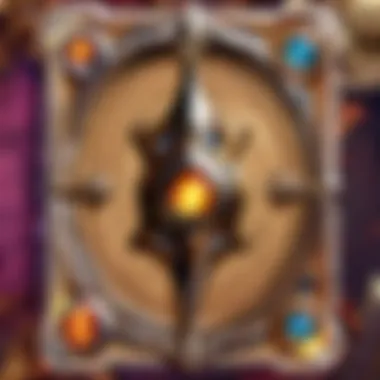An In-Depth Look at Deck Helpers in Hearthstone Strategy


Intro
In the complex realm of Hearthstone, deck helpers emerge as crucial tools for players seeking to enhance their gameplay experience. They serve as valuable resources to both new and seasoned players, providing strategic insights and deck recommendations. Understanding their role can greatly influence the outcome of matches. This section presents an overview of what lies ahead in the exploration of these aids, detailing their types, mechanics, and effectiveness.
Game Updates and Patches
Regular updates and patches are integral to maintaining Hearthstone's dynamic landscape. Recently, significant game updates introduced new mechanics and adjusted existing cards, impacting overall gameplay. In addressing deck helpers, understanding these changes is essential.
Overview of the Latest Game Updates and Patches
The most recent patches have implemented several key changes. New cards have been added, each bringing unique abilities to the game. Aging content saw balance tweaks, optimizing overall gameplay fluidity.
Detailed Breakdown of Changes and Its Impact on Gameplay
For instance, the introduction of card archetypes has reshaped strategies. Cards like Battlegrounds Battlemaster provided additional strategies, broadening possibilities for combo play. Players must stay updated on these revisions to utilize deck helpers effectively. Some popular cards have also been nerfed. Impactful changes occasionally lead to a shift in competitive decks people's use.
Analysis of New Cards and Mechanics Introduced
When new cards come into play, evaluating their synergies within existing decks becomes necessary. Deck helpers often feature identifiers that suggest optimal card combinations based on these revisions. Compatibility can change rapidly, so using such tools aids in creating well-balanced decks.
Deck Strategies and Meta Analysis
The interaction between deck helpers and current meta context is complex. Players should treat these aids as guides rather than absolutes. Deck strategies benefit from adaptability; insights into popular techniques can enhance player success.
Top Deck Recommendations for Different Play Styles and Skill Levels
A variety of deck archetypes cater to diverse play styles. Aggro players may find success with face hunter decks while control enthusiasts lean towards compli batch and slower builds. Deck helpers typically analyze win rates and player feedback, recommending optimal paths based on individual strengths.
Insight into the Current Meta and Popular Deck Archetypes
Analyzing the present meta involves recognizing trending decks. Tools that analyze the ladder can provide updates and wariness to global shifts. Decks like Dragon Combo or Secret Mage currently dominate many matches, demanding strategic counters. Hence triple-checking stats, you see, is important for informed gameplay.
Strategies for Countering Popular Decks and Tech Choices
Players must familiarize themselves with counters. Employing controlling elements or specific tech choices can disrupt opponents. Mechanics like silence, board clears, and specific card choices consistently surprise commonplace strategies.
Card Reviews and Set Reviews
Card reviews dissect the individual contributions of new cards. Evaluating their potential may benefit directly from the use of deck helpers. Frequent updates and assessments can lead to nuanced understanding of card significance.
In-depth Reviews of New Cards and Their Potential Impact on the Meta
As expansions or card sets from the game release, reviewing individual mechanics and properties helps forecast future prominence. Understanding when a card fits into a current meta is crucial, enabling strategic adjustments.
Evaluations of Card Synergies Within Different Deck Archetypes
Every deck nees to balance individual synergies. Explaining why specific matches work is the essence of successful combinations. The coexistence arisen through surface interplay some caught player's attention.
Set Reviews Focusing on Value, Versatility, and Competitive Viability
Evaluations of sets emphasize their immediate influences and longevity. Tools like deck synergy should be utilized to gain an accurate appraisal. Assessments culminate in identifying whether new sets rise in high-level gameplay or merely serve beginners.
Player Guides and Tips
Players benefit significantly from strategic guides emphasizing core concepts. Beginner players often struggle with understanding cards effectively, spotlighting the need for educational approaches.
Beginner's Guides to Understanding Core Game Mechanics and Strategies
Introducing main mechanics fosters smoother transitions into matching formats. Game tutorials, backed by deck helpers, facilitate beginner adaptation by offering role breakdown and clear visuals.


Advanced Tips for Improving Gameplay and Decision-Making
Once foundational knowledge is achieved, emphasis shifts towards refining tactics. Identifying critical decision points in matches and practicing offsetting any overanalysis encourages player confidence and decision-making agility.
Arena Drafting Strategies and Arena-Specific Gameplay Tips
Utilizing deck efficiency through drafts grants trading evidence. Players who adapt filters their drafting accordingly often find increased enjoyment overall. Arena drafts often exemplify faster techniques, favoring versatility in early throne of deck harmonizing.
Engaging with deck helpers not only informs choices but also sharpens analytical integrity regarding individual play styles and goals. Through strategic involvement, enhancements come naturally.
Whether a novice seeking a foothold or an advanced player refining competitive edge, understanding deck helpers enlightens various avenues of gameplay, revealing depths often overlooked. As strategies and as exhaust diversifications subtly advance, every player requires tools in navigating complexities signature to Hearthstone's decision-making intricacies.
Understanding Deck Helpers
Deck helpers have emerged as essential companions for players navigating the complexities of Hearthstone. They offer various tools that can significantly enhance gameplay strategy. In this section, we cover what deck helpers are, their implications in card games generally, and why they matter for contemporary players.
Definition and Purpose
Deck helpers are tools designed to assist players in building, refining, and analyzing their card decks. These can range from simple online calculators that suggest card combinations to sophisticated data-driven apps that offer up-to-date information on card performance. The purpose behind these helpers is straightforward: to enable players based on their skill level to make more informed decisions. Here are some key aspects to keep in mind:
- Team Dynamics: Different deck helpers cater to various playing styles. A new player might benefit from tutorials and advice, while an expert may focus more on analytics and meta-game changes.
- Building Efficiency: Building a win-worthy deck can be arduous without assistance. Deck helpers streamline this process, providing suggestions based on given parameters.
- Adaptability: Meta changes can impact game outcomes significantly. Many deck helpers integrate ongoing data analysis to help players stay adaptable, ensuring their lineups remain competitive.
Historical Context in Card Games
The utility of deck helpers is not unique to Hearthstone. They have evolutionary precedents in broader card gaming history. Initially, players depended on rule books and the experiences of older players for strategy enhancement. As technology advanced, the landscape shifted profoundly.
Traditional card games offered few resources for adaptation. This gradual evolution seen in the 1980s adapted well into the internet era, propelling tools that included card scans and probability calculators. Moving forward, Hearthstone's interactivity and online gameplay fostered development of new-generation helpers. Today, the convergence of user-generated content alongside analytical tools creates a rich density of resources tailored toward advancing player expertise, ensuring a competitive environment strengthened by information.
Players who can complement their instincts with rigorously analyzed data often achieve better outcomes. Historical elements reminded card enthusiasts that personal understanding and technical tools function better together.
Types of Deck Helpers
Understanding the different types of deck helpers is crucial for any Hearthstone player looking to optimize their gameplay. A thorough comprehension of these tools not only broadens strategic options but also helps tailor approaches based on personal needs and preferences. Players can easily move beyond traditional gameplay by incorporating such tools, which grant various levels of analysis, support, and community engagement.
Online Tools and Calculators
Online tools and calculators have become cornerstones for players seeking to refine their deck strategies in Hearthstone. These tools typically offer functionalities that range from deck building to game simulation. Some renowned tools include HearthPwn and Hearthstone Deck Tracker.
For example, players can input cards they want to use, and the tool generates potential synergies and win rates. This feature aids players in understanding how particular cards interact within different combinations, enhancing game knowledge. However, users must consider that not all calculators take into account the live meta, which can skew their mock-up results.
When choosing an online tool, consider the following:
- Usability: An intuitively designed interface makes for an effective experience.
- Updated Data: Check how frequently the tool updates its card databases and meta images.
- Community Support: Tools that offer shared experiences and community recommendations often provide deeper insights.
"Online tools enable players to digitaly augment their knowledge and quickly test various deck theories."
Mobile Applications
Mobile applications offer another insightful angle into deck helper resources. With many gamers seguing to mobile devices, applications such as Hearthstone Deck Tracker and HSReplay have flourished. Mobile platforms enable players to track their performance, analyze card usage, and compare deck effectiveness at a glance.
Accessibility is a key advantage here. Players can casually check strategy updates or formulate deck ideas without needing a computer. This ábility fosters experimentation by allowing for quick adjustments. It's overly useful during commute or down times.
However, usability can differ among apps: some may lack functionalities found in web-based tools. It is essential to evaluate what you seek. Are you primarily interested in statistics, deck building, or general strategy? Your answer will steer the choice of which application might suit your needs surrounding ease of access and immediacy.
Community Forums and Discord Channels
Community forums and Discord channels serve an integral role for someone interested in the socio-element of deck building. Forums like Reddit have dedicated threads for discussing strategies, reviewing deck compositions, or sharing win rates. Particularly thriving channels can be found in subreddits focusing on Hearthstone strategies.
Discord channels enhance this experience further by facilitating real-time discussions and engagement. Players often receive instant feedback on deck ideas or game encounters. This conversational element makes sorting through advice much more manageable. Knowledge not only spreads faster; it adapts to current and evolving meta discussions.
While some may argue that information overload can come from numerous opinions, qualified and experienced players usually offer insight that really helps. Always filter through advice based on individual integrity and depth of knowledge. Given the personalized dynamic of threads versus dedicated chats, community spaces foster growth not immediately achievable through solitary play or somber analytical focus.


Benefits of Using Deck Helpers
Using deck helpers offers significant advantages for players engaging in Hearthstone. These tools can elevate one's understanding of the game, resulting in more informed decisions and enhanced gameplay. Players can gain a strategic edge while experiencing both efficiency and relevance through these aids.
Strategic Insights
Deck helpers provide players with deep insights that help adapt and refine gameplay strategies. It can analyze current trends, recommend deck compositions, and even evaluate opponents' strengths and weaknesses. Such tools provide critical information on matchups based on the current meta. With consistent updates and data analytics, players can identify strong synergies among cards. This understanding enables them to craft decks that exploit their opponents' weaknesses while maximizing their own strengths.
In addition, these insights can foster a better understanding of card interactions and how various combinations may perform under different circumstances. For example, utilizing a tool that showcases win rates for different cards within set conditions can help players decide which cards yield the best results.
Efficiency in Building Decks
Building a competitive deck from scratch can be a daunting task. However, using deck helpers streamlines this process. Players can input preferred card types or specific themes they want to center their decks around. Once entered, helpers will quickly generate deck lists that optimally incorporate cards synergistically. This saves an extraordinary amount of time and effort, especially for beginners who may still be familiarizing themselves with average effective choices.
Moreover, deck helpers can analyze existing decks to highlight areas of improvement or offer alternative suggestions. Deciding which new cards to include or retire becomes less of an art and more a calculated decision based on statistical outcomes and community feedback. Such efficiency empowers players to spend more time honing their actual gameplay skills rather than becoming overly bogged down with deck construction nuances.
Staying Current with Meta Changes
Hearthstone, like many card games, is susceptible to shifts in the meta as new expansions are released or balancing changes take effect. Staying updated is vital for maintaining competitiveness. Deck helpers can track these changes and adapt analyses accordingly.
Players frequently rely on these tools to get immediate updates when cards are buffed or nerfed, noting what strategies emerge or disappear. This responsiveness ensures players aren’t left using outdated or unreliable decks that may underperform against a fast-evolving field. Effective deck helpers not only reflect changes in win rates, but can also suggest immediate adjustments based on current meta conditions.
“Utilizing deck helpers leads to smarter gameplay decisions, echoing alignment with current trends and strategies.”
For those seeking more support, platforms like Reddit can be an excellent resource for finding recommended tools and communities sharing advice on how to best integrate these helpers into gameplay.
Limitations of Deck Helpers
Deck helpers can be important tools for players of Hearthstone, but they also have certain limitations. Knowing these limitations can help players use them better, understanding both their strengths and weaknesses. In this section, we will consider two main limitations: over-reliance on tools and the quality of the information provided.
Over-reliance on Tools
One of the main concerns with using deck helpers is the risk of over-reliance. Players might depend heavily on these tools, neglecting their own skills and understanding of the game. This can be detrimental for various reasons.
- Skill Development: Relying too much on tools can stunt personal growth. A successful player needs to analyze games, learn from experiences, and make adjustments. If one depends only on what the tool suggests, it becomes difficult to develop these important skills.
- Gameplay Awareness: Deck helpers provide general strategies and recommendations based increasingly on algorithms and player behavior. They might not take real-time dynamics of matches into account. For instance, the pacing and speed of a current tier may influence card choices. Ignoring in-game situational awareness is a big problem if players only listen to tools.
In this sense, strike a balance between using deck helpers and practicing active engagement with the game table.
Quality of Information
The second major limitation pertains to the quality of information that deck helpers provide. Not all tools are created equal. The effectiveness of a deck helper relies heavily on the accuracy and reliability of its underlying data. The following points clarify important aspects of this limitation:
- Source Credibility: Players need to pay attention to where the information is coming from. Different sites and applications may aggregate data from various sources. Some might lack the expertise or data accuracy needed to make sound recommendations.
- Meta Relevance: Often, these tools analyze past games to offer bids. However, constantly shifting metagames can allow prior analisys to become outdated quickly. Players must test different combos and strategies post-expansion.
How to Choose a Deck Helper
Choosing the right deck helper is a crucial step for any Hearthstone player. The variety of tools available can greatly influence your gameplay and deck-building experience. Effectively, the right choice will depend on individual needs and preferences. Understanding what you seek from these tools is paramount. You want one that supports your gameplay objectives and style.
Assessing Personal Needs
Before diving into different tools and their features, assess what you genuinely need. Consider the following:
- Skill Level: Are you a beginner, general player or a hardcore competitor? Higher-end players may need advanced analytics while newer players may prefer tutorials and simpler features.
- Purpose: Identify what aspects you want to improve. Is it card synergy, win rates, or just basic deck building? A clear understanding helps narrow down your options.
- Time Commitment: Some players may want quick solutions, while others may enjoy diving into deeper strategical analyses.
When you think about these factors, you can start selecting deck helpers more effectively. Each player comes with a distinct experience, and finding tools that align with your gameplay aspirations is crucial.
Evaluating Features and Usability
Once you outline personal needs, assess the features of each deck helper. Take note of:


- User Interface: The tool must be user-friendly. Complexity may scare off users, particularly beginners.
- Data Offered: Check whether it provides thorough insights like win rates, loss statistics, or match up guide. The quality of the information is essential.
- Real-time Features: Some exceptional tools offer live matchmaking or updates on favorable decks to help players adapt more efficiently to the current meta.
- Compatibility: Ensure that the deck helper plays well with our various devices. Mobile compatibility or browser extensions can enhance its usability flatically.
These evaluation steps shall assist you in making a high-quality choice simplifying your Hearthstone experience. Combining these factors allows indeed a smoother fit between your needs and the tools that claim to fulfill them. Remember, a good deck helper can indeed save time and make your gameplay smarter.
Integrating Deck Helpers into Gameplay
Integrating deck helpers into gameplay is crucial for Hearthstone players who seek to level up their skills and strategies. While deck helpers can provide valuable insights, knowing how to effectively incorporate them into gameplay requires a thoughtful approach. It is not just about using tools; it is about using them to enhance your understanding of the game.
Combining Tools with Practical Experience
Players must blend the insights offered by deck helpers with their own gameplay experiences. Using a tool without the context of practical experience can lead to improper conclusions. Hearthstone is fundamentally a game of strategy and timing, which means that while your tool may suggest optimal plays based on statistics, you still need to understand why those plays work in practice.
- Observe Your Playstyle: Track how your choices align with the recommendations from your deck helper. This will show you where your intuition aligns or diverges from statistically favored plays.
- Adapt Tools to Fit Your Strategy: Do not treat the tool as the final authority. Instead, implement its suggestions while considering the unique circumstances of the match. For example, if your deck helper suggests adding card that synergizes with a strategy, ensure it fits your intended playstyle and in-game situation.
Ultimately, the merging of practical knowledge gained through gameplay and theoretical insights offered by deck helpers can lead to a well-rounded approach to match strategy.
Adapting Strategies Based on Data
Another essential component of integrating deck helpers into Hearthstone gameplay is adapting strategies based on the data provided by these tools. The effectiveness of a strategy can change dramatically based on the current meta and the specific matchups you encounter. Periodically reviewing data generated by deck helpers will enrich your understanding.
- Meta Analysis: Use deck helpers that provide a comprehensive overview of current trends within the Hearthstone scene. Understanding what works well might mean selecting cards that counter popular strategies.
- Game Outcome Review: Many tools facilitate outcome tracking. Reviewing the successes and failures of specific decks or cards can shed light on areas that need improvement. Choose aspects that resonate with your experiences and adjust your strategies accordingly.
Future of Deck Helpers
The future of deck helpers in Hearthstone signifies a promising landscape where advanced strategies and technology converge. As card games evolve, the tools accompanying them must also grow. Players demand versatility and efficiency, pushing developers to innovate. Understanding future developments informs how to best harness these aids.
Technological Innovations
Technology stands at the forefront of changing how players engage with Hearthstone. Distributed platforms like desktop tools and mobile applications breathe convenience and accessibility into monitor_remapping and deck-building processes. Innovation unfolds in areas such as artificial intelligence and machine learning, analysis arms players with actionable insights based on historical game data.
Some potential technological developments are:
- AI-assisted deck recommendation
- Real-time synergy evaluations
- Data analytics to predict opponent behavior
Players begin to see tools not just as helpers but as allies in competitive play, analyzing game trends and suggesting plays instantaneously.
This could drastically lessen the learning curve required to master intricate decks, empowering even novice players to compete on high levels.
Role in Competitive Play
In competitive settings, the significance of deck helpers escalates. They provide players with an edge that is particularly critical in tournament scenarios. With the complexity of Hearthstone’s evolving metagame, these helpers become central to strategy formulation. They can analyze information to recalibrate tactics instantly from opponent patterns.
Examples of deck helpers presently aiding competitive players include:
- Tournament optimization calculators
- Meta-analysis dashboards
Considering this, embracing deck helpers is becoming less about relying solely on one’s instincts. Instead, it is about harnessing tools that operate within current competitive frameworks. Their intuitive designs can adjust player approaches efficiently before and during matches.
The incorporation of technology into deck decision-making will change how matches are played and understood at the tournament level.
In summation, the forward-thinking development of deck helpers not only enhances individual player experience but also shapes the broader culture of gaming. As Hearthstone continues evolving, it’ll be interesting to see how technology comprehensively integrates into the strategic dimensions of gameplay.
End
The examination of deck helpers in Hearthstone encapsulates significant elements for players at all levels. These tools emerge as vital allies in crafting effective decks, offering insights and strategies that can enhance gameplay.
Summary of Insights
Throughout the article, we explored how deck helpers serve multiple roles, from providing card recommendations to optimizing overall strategy. Players benefit from understanding the current meta, the qualities of various heroes, and what decks can potentially counter others effectively.
Key advancements in tools today streamline the deck-building process, making it accessible to those who might struggle with this aspect of the game. It also highlights a commitment to adapt strategies in an ever-evolving environment. These helpers can sometimes differentiate casual play and competitive ranks.
Encouragement of Critical Thinking in Gameplay
While deck helpers are helpful, it is crucial for players to engage critically with the data presented. The numbers, win rates, or prevalent strategies should spur reflection rather than become a strict guide. An over-reliance on any tool hampers growth and creativity in self-directed strategizing. Crucial thinking about the position, which cards fit better in context, or improvisation based on real-game scenarios can set skilled players apart in their arenas.
In this way, players are encouraged to analyze, adapt, and rethink their approaches rather than simply consuming static information. Striving for a balance between using deck helpers and maintaining one's insight on the dynamics of play fosters adaptable and innovative gameplay.







